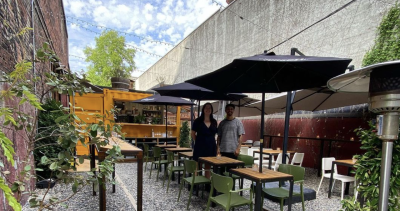B.C. Green Leader Andrew Weaver applauds premier's call to ban U.S. thermal coal exports from B.C.
Three years ago, the leader of the B.C. Greens tried to persuade fellow MLAs to halt the expansion of thermal-coal exports through B.C. ports.
At the time, Andrew Weaver pointed out in a speech in the legislature that in 2011, B.C. emitted 62 megatonnes of carbon pollution.
"Our legislated goal is to reduce our emissions to 43 megatonnes by 2020 and to 13 megatonnes by 2050," he said in the legislature. "If LNG is to decrease Chinese emissions by 90 megatonnes per year, we will have to produce it. What this means is that while China could decrease its emissions, we will certainly increase ours."
Weaver also cited a growing list of extreme weather events: "floods in Calgary and Britain, record droughts in California and Vancouver Island, record-breaking heat and fires in Australia, devastation in the Philippines from Typhoon Haiyan and in New York from Hurricane Sandy".
Later in his speech, he said that the expansion of thermal-coal exports was going to result in a 100-megatonne increase in emissions.
"To be clear, I'm not suggesting we ban coal exports or in any way limit our metallurgical coal industry in British Columbia," Weaver said. "I'm talking specifically about the expansion of thermal coal exports that originate outside our province. When those are factored in, the numbers just don't add up."
Then he introduced an amendment to the throne speech calling for a halt to the expansion of thermal-coal exports in B.C.
The amendment noted that that there has been an increase in U.S.-sourced coal coming through B.C. on its way to export markets.
In response, the B.C. Liberal energy minister, Bill Bennett, stated that coal is one of B.C.'s most important industries.
Bennett also said that "the job impact from allowing U.S. coal to go through our B.C. ports...is significant."
"Those jobs at the ports that we have here on the west coast are important jobs to the families who have them," Bennett added. "And if we can have more family-supporting, high-paying union jobs here on the west coast without doing anything that's irresponsible, then we should be looking to do that."
The B.C.'s then environment critic, Spencer Chandra Herbert, said "the throne speech can't be amended just to address one aspect if it's so vacant and bare in others."
Chandra Herbert cited B.C. having the worst child poverty in Canada as one example.
"A plan to fight climate change would invest in transit," the NDP MLA said at the time. "Yet this government refuses, costing us $1.5 billion annually, according to the board of trade, and untold costs to our health and, of course, the climate.
"A plan to fight climate change would invest in green energy retrofits to help people reduce their own gas consumption, insulate homes and public buildings, and save
power," Chandra Herbert continued. "Yet the government largely cut that program."
In the end, Weaver was the only MLA who voted for his amendment. Seventy-three other B.C. Liberal and NDP MLAs, including current B.C. NDP Leader John Horgan, voted against amending the throne speech to halt the expansion of thermal-coal exports from B.C. ports.
All 11 Vancouver MLAs voted against the motion to curb thermal-coal exports: Suzanne Anton, Chandra Herbert, Adrian Dix, David Eby, Mable Elmore, George Heyman, Jenny Kwan, Shane Simpson, Moira Stilwell, Sam Sullivan, and Andrew Wilkinson.
Premier Christy Clark wasn't present and didn't cast a vote.
And today, the premier wrote a letter to Prime Minister Justin Trudeau seeking a ban on thermal coal—including U.S. shipments—being exported from B.C. ports.
It's in response to the U.S. Commerce Department imposing a countervailing duty on Canadian softwood lumber imports.
“I’m glad to hear that the premier is finally calling for a halt to the expansion of thermal coal exports," Weaver said in a statement today. "This move is long overdue. Washington, Oregon and California have already moved to ban thermal coal exports. It is high time that British Columbia showed leadership on this issue as well."
Later in his statement, Weaver added: "I sincerely hope that this move the premier has made is more than just election politics. With the news earlier today that the Trump administration is considering pulling out of NAFTA, B.C. needs to be carefully coordinating all of its moves on trade with Ottawa to ensure that B.C.’s interests are always front and centre.”















Comments